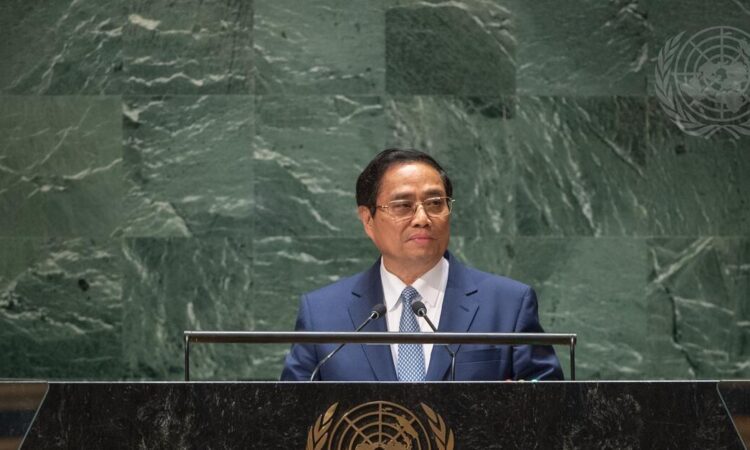
PHAM MINH CHINH, Prime Minister of Viet Nam, noted that, having endured great sufferings and sacrifices in the past century, his country understands better than any the value of cooperation “and putting the past behind” to turn enemies into friends and partners. As a model for post-war cooperation, recovery and reconciliation, Viet Nam prioritizes the values of trust, sincerity and solidarity, all of which enhance multilateralism. Citing threats including the arms race and the risks of weapons of mass destruction, non-traditional security challenges, climate and food insecurity, he posed the critical question: What do world leaders need to do to help their respective nations and the world writ large? “Global challenges require global solutions,” he stressed, urging the international community to foster sincerity and trust through candid dialogue to address differences and prevent and contain conflicts, and refrain from the use of force and power politics.
He emphasized the need for enhanced international solidarity, with each country placing its interests in the broader picture of the international community, strengthening the central role of the UN. Affirming Viet Nam’s solidarity with other countries, including Cuba, he urged the United States to end its embargo of the island nation. States require solutions for the whole population, with people as the centre and goal, as development can only be meaningful when it benefits every person — creating jobs, enhancing investment in education, social security and healthcare. He affirmed the importance of holistic political, economic and social measures, promoting innovation and startups, reducing trade and investment barriers, and facilitating market access. He further called for expedited reforms of international financial and monetary institutions towards more equity and equality for developing countries, improving their ability to effectively manage risk.
It is likewise crucial to mobilize and effectively utilize resources in which self-reliance and resilience and harnessing potential are important factors, underscoring the prosperity and strength of each nation, region and the world at large. Least developed countries are the most vulnerable to the severe consequences of climate change, natural disasters and diseases, requiring substantial assistance in finance, technology, human resources and governance. He further voiced support for the Summit of the Future to effect changes via a new mindset, modus operandi and actions with a view to help multilateral institutions operate in a more synchronized manner. Quoting former President Ho Chi Minh, he stated: “a country is rooted in its people, only when the root holds strong can the tree stand firm”. By building on that philosophy, Viet Nam has recoded historic socioeconomic achievements across the board, with the multidimensional poverty rate having dropped to under 2 per cent.
Viet Nam steadfastly pursues the consistent foreign policy of independence and self-reliance, and remains a responsible member of the international community. He recalled that Vietnamese men and women from the People’s Army and police forces have been participating in UN peacekeeping missions. Domestically, the country is expediting an energy transition to achieve net-zero emissions by 2050, and maintains food security for a population of 100 million — while also striving to export around 7 million tons of rice in 2023, helping to ensure global food security. “From a region plagued with war and division, Southeast Asia has emerged as a region of solidarity, friendship and cooperation, and an epicentrum of growth,” he affirmed. Moreover, ASEAN has affirmed its centrality in maintaining peace, security and prosperity in the region. He reaffirmed the country’s commitment to working with countries within and outside the region to safeguard peace, stability, security, safety, and freedom of navigation in the South China Sea.






